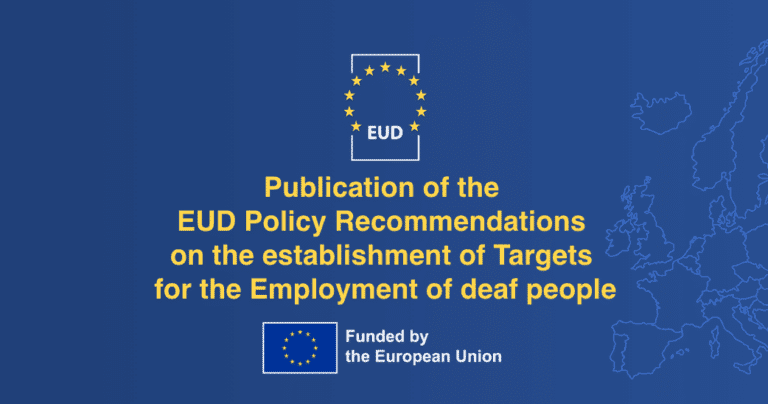We are pleased to present our latest policy recommendations on access to the labour market for deaf persons in the European Union (EU).
Our policy paper sheds light on the unjustifiably low employment rate of deaf people in the EU. It underscores the critical need for national sign language-inclusive environments to ensure a fully accessible labour market for deaf individuals. Despite the EU’s commitment as a State Party to the United Nations Convention on the Rights of Persons with Disabilities (CRPD), there is a misalignment between the Commission’s actions and its obligations under Article 27 on work and employment.
This paper outlines the “what,” “why,” and “how” regarding the employment issue for deaf people in the EU and provides concrete policy recommendations for the Commission to increase the employment rate of deaf individuals.
We call upon the Commission to implement these recommendations as soon as possible, as this is a significant step toward reaching the EU’s goal of becoming a ‘Union of Equality.’
Executive Summary
The employment rate of deaf people in the European Union (EU hereafter) is unjustifiably low. Not only are there a lack of statistics to measure the situation of deaf people when accessing and within employment but there is also a lack of understanding, in the EU, of the importance of national sign language-inclusive environments to ensure a fully accessible labour market for deaf people. The EU is a State Party to the United Nations Convention on the Rights of Persons with Disabilities (CRPD). However, the European Commission’s (the Commission hereafter) actions do not align with its obligations under the CRPD, and specifically, with its Article 27 on work and employment.
As the official representative organisation of all deaf people within the EU, the European Union of the Deaf (EUD) has the mandate to guide the EU in crafting policies implementing the CRPD that are beneficial to deaf people. This paper aims to put a spotlight on the lack of disaggregated data on the access of deaf people to employment and the necessity to design targets increasing their employment rate.
The first part of the paper addresses the “what” in terms of the issue at hand – the employment rate of deaf people in the EU remaining low. It highlights the difference between “employment targets” and “indicators” and then outlines the legal and policy instruments obliging the Commission to establish employment targets supporting the inclusion of deaf people in the labour market. Following this, the situation of deaf people accessing employment is explained through the absence of data measuring their inclusion in the labour market. Moreover, the paper highlights that an inclusive labour market for deaf people is reached through national sign language-inclusive work environments. The second part of the paper deals with the “why” by providing an outline of the role targets play in bridging the gap in the access of deaf people to the labour market. Thirdly, the paper looks at the “how” in terms of how the Commission can set effective targets using the EU’s Social Scoreboard as a tool to achieve the inclusion of deaf people in the labour market.
Lastly, after researching and consulting several EU and international policy and legislative frameworks, as well as any available EU level statistics on employment in general, EUD has identified the following policy recommendations for the Commission’s development of effective targets to increase the employment rate of deaf people:
Improve and increase data collection efforts on the number of deaf people disaggregated by their intersecting identities in employment, by utilising the EU Semester Process, in support of the European Pillar of Social Rights;
Revise the Social Scoreboard to include indicators disaggregated by disability group, including deaf people, reflecting their intersecting identities alongside their disability, including racial or ethnic origin, languages, gender identity, socio-economic status, sexual orientation, age and any other layers of identities, in line with its commitment under the EU Disability Rights Strategy 2021-2030 to set new indicators;
Design specific policies towards ensuring inclusive national sign languages labour environments for deaf people, in line with Article 27 CRPD and its General Comment n°8 to complement the establishment of the employment targets.
Continually monitor the progress made by the employment targets on the number of deaf people in employment, using its obligations with the CPRD as a guide, through meaningful consultation EUD at the EU level and their National Associations of the Deaf at the national levels.
Accordingly, EUD calls the Commission to implement its recommendations without delay. Only then will the EU take a step closer to achieving its goal of becoming a ‘Union of Equality’.













